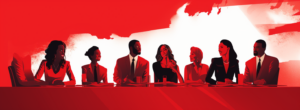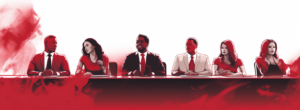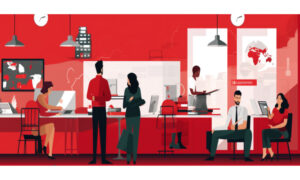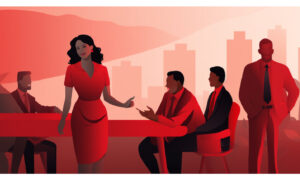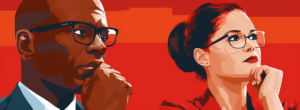"We live in a world of ideas" - Dave Ulrich
- 15 Min Read
The name Dave Ulrich is synonymous with HR, he designed arguably one of the most tangible and robust HR models in existence as well continuously encouraging the term HR to be reinvented and reborn to adapt to the skills and generations of the modern workforce.
- Author: Emily Sexton-Brown
- Date published: Jun 21, 2018
- Categories

 For Ulrich, if we aren’t constantly learning about how talent, leadership, and organisations operate, we end up in a vicious circle of irrelevance… Discovering new insights and propelling them into actions is for Ulrich the single most important action of truly inspiring leadership.
For Ulrich, if we aren’t constantly learning about how talent, leadership, and organisations operate, we end up in a vicious circle of irrelevance… Discovering new insights and propelling them into actions is for Ulrich the single most important action of truly inspiring leadership.
Ulrich has been ranked the #1 Management Educator & Guru by BusinessWeek, selected by Fast Company as one of the 10 most innovative and creative leaders, is one of 21 people in the Thinker’s Fifty Hall of Fame, and named the most influential thinker in HR in the last decade. We speak exclusively to him across different facets of HR, we discover the opportunity that can be seized out of simple ideas, the integral need for the digital age to enable relationships and not destroy them as well as Ulrich’s insights into the biggest challenges that face the industry right now.
Could you give me a brief overview of how you arrived where you are?
Decades ago when I was in law school I took a course in organisational behaviour, at the time it was a new field. While I took the course mostly to fill a requirement, the professor (who has since become a friend and mentor) captured my imagination. . He challenged us to look at the oragnisations in our lives, be it where you work or live and figure out how they shape who you are and what you do. He urged us to read novels, go to the movies and apply these to the organisational principleswe were learning about. This led to me to writing papers such as ‘Beowulf – the ideal organisation man’ or ‘Shakespeare’s sources of power in King Lear’. My mentor-professor really liked my work and noted my keen interest (more than my English literature professors) he encouraged me to delve deeper into these ideas and I decided to take more and more classes within the behaviour field and eventually ended up exclusively doing it.
“The mantra was – ideas with impact”
Onwards I ended up doing a PhD and continued to be fascinated with what happens in the organisational life in which we live and I studied that within my PhD programme, along with statistics and taxonomy – the study of patterns and simplicity. I was fascinated with these ideas, but I wanted to see them play out, I didn’t want to live in the abstraction. I wanted to put what I’d been learning into practice. The mantra was – ideas with impact, I ended up teaching 34 courses at 3 universities during my PhD programme because I wanted to take the ideas created that fascinated me and then turn them into practice. When I finished my PhD I went to the University of Michigan and have been here for the past 35 years – continuing to probe these ideas around how to build organisations and really shape value. How does this shift HR? If you have a business strategy and direction with structured goals you can’t sustain the change the business needs without HR infrastructure, without people or hiring or compensation. HR fully represents the infrastructure for sustainable change. I’m not training as a classical HR professional, but I am interested in how you sustain business success (and create value for employees, customers, and investors) with HR practices.
What has been your key career highlight so far?
There are two career foundations that go together. First, I have a commitment to learning. I have an implicit rule that I need 20-25% of new material every 2/2.5 years. This sounds doable, but it’s a challenge to stay fresh and to constantly reinvent and keep learning new things. There are so many people in my field who are so polished they are like actors or performers presenting their scripts., My material isn’t always as polished because I’m always trying to create the next thing. I have a committed passion for this kind of learning. One of my favourite teaching days is to sit with a group and noodle and muse on ideas and create real-time logic structures and models for making sense of the ideas. My second foundation is an abiding commitment to adding value. Falue is not what I’ve learnt or what I do, it’s always the impact of what I’ve learned. It’s like writing a great article, the article needs to impact upon the readers to make it great. For me it’s not the book I read, or the class I teach is the impact of what I’m actually doing, Value is defined by the receiver more than the giver.

Where do you think HR is headed, can you give me some insights into what you think HR might look like in the coming years?
It’s always hard to predict what’s going to happen next because linear projections don’t always come true, for example we’ve seen HR growing up as a psychological orientation focusing on the person. In the 60s, 70s, 80s we nurtured people in this humanist movement, then it moved onto the war for talent and now we are seeing an extension of that called the employee experience which is rediscovering it’s old roots, it’s a powerful stream.
But, ff I start on a less humanistic point and begin by looking at what does a business has to do to create value within their marketplace win, then I have a different take. ? My focus gets framed a little different moving from treating people well to delivering business value. In our executive teaching we often ask participants to list what they want to learn from the executive program. We get answers like “trends in talent”, “digital HR,” latest compensation practices, or how to redesign an organization. We then ask them to put the two words “so that” behind their answer to pivot their desires from HR activities to the outcomes of those activities. When we start with helping a business win, we clearly attend to talent, but we also have to build the system or organization to wisely deploy the talent. So, I am interested in wow do you get high performing team, not just an individual? How do you build a process, not just develop a person? We found in our research that organization had four times (yes, four times) the impact on business performance than individual competence. We need to win the war for talent by creating a victory through organization, then, leadership is a subset of the two, leaders are the people who shape an organisation. I reviewed a paper recently entitled ‘Leaders Don’t Matter’ and I thought, what world is this person living in? Leaders shape the world, for businesses to win, it needs great leadership. How does HR then develop the processes, the tools and the disciplines to make these three things happen? I think this will continue for the next few years.
“I didn’t want to live in the abstraction”
However, I think sometimes the HR field is overwhelmed by ‘fads’. For example, we are all consumed with millennials, but not in actual fact it’s not all about millennials – there is the bonus year of employees, the 60-year olds that will live until they are 90 or in Lynda Gratton’s world, 100.
Then another huge focus is analytics, you’ve got to have analytics, good HR has been analytical for decades. My PhD is in statistics, but great HR people have done empirical work for decades, however now it’s all about the ‘employee experience’ but when I think about it, it’s actually work that was done 30 years ago. Now, the big topic is digital. So, what is digital? Digital is simply a set of technologies that enable you to access information more rigorously which is absolutely critical to what we do. Digital information improves what we do, but it’s not the only thing that helps. I keep coming back to these three strands, how will it help the organisation build talent, leadership and organisations that enables value to be created for the people and the organisation, the customers and the investors?
Do you think HR is now made up of two very separate areas – soft skills (wellbeing focus) and the hard skills (AI focus)?
Yes, and I’d like to point you in the direction of a great book, it’s called Dying For a Job, it’s by Jeffrey Pfeffer, a Stanford professor. He’s gone through the mental health research on physical wellbeing and the impact that the workplace has on it. My sense on this general topic is that we haven’t leveraged the benefits of AI, and I’ll give you a framework to this point. My PhD and training is in taxonomy which is the science of order, I’ve simplified 4 areas of AI:
Phase one – Efficiency. We need solutions (payroll being automated etc) and I think what will happen is we will start to insource what we previously outsourced.
Phase two – Innovation in HR. I’m seeing an overwhelming tsunami or HR innovation apps on training. I get emails almost every week asking if I’ll invest in certain technologies. I heard about one recently that have facial recognition which then tells you what kind of leader you are going to be. I’m feeling totally overwhelmed. I would say that 90% of most HR technology are in one of these two phases. Efficiency, do it better. Innovation, do it differently.
Phase three – Emerging information. Digital should give us information and insights about employees, some of that is well-being for instance when you treat your employees badly the healthcare costs go up. The productivity goes down. There is information there that really drives results – so what can we do going forward, what interventions can we introduce?
Phase four – AI technology building connections and relationships. It often doesn’t do this well enough, a lot of technology distances people rather than connects people. Technology may make us part of a global movement, in America recently high school students recently protested for a day, and the technology-enabled some of that movement to occur. That’s not a belonging, that’s not a relationship. I think technology’s next wave in HR, is how do we use HR to connect people and create belonging within the organisation. I don’t think we’ve done that very well.
I like to analyse in conversations or events I go to what is being covered on the innovation scale, what’s being covered across efficiency, and what is emerging and enabling personal relationships within work and HR?
Why do people fear technology?
 The data is out there, in the UK in November a minster of loneliness was appointed. In the US the biggest health problem is isolation and loneliness, I think technology exacerbates isolation. I go to a college campus where I teach, people have headphones on and don’t look up. They are using technology to live in an isolated hive, and it scares me. I have a fear around Facebook and snapchat, because the people who spend more time on these social medias are more depressed, more negative about the world and eventually it leads to mortality. A colleague in Australia who studied young teenage girls and she discovered that many of their friends who are using these social platforms seem happy all the time, when you post the beach shot, or the birthday shot or the friendship shot but in actual fact that person might be sat in their bedroom on a Friday night and is actually quite miserable. In every reality, we are not happy all the time. We don’t use technology to connect people in real ways – one of the things that the advertising world is discovering is authenticity and real behaviours.
The data is out there, in the UK in November a minster of loneliness was appointed. In the US the biggest health problem is isolation and loneliness, I think technology exacerbates isolation. I go to a college campus where I teach, people have headphones on and don’t look up. They are using technology to live in an isolated hive, and it scares me. I have a fear around Facebook and snapchat, because the people who spend more time on these social medias are more depressed, more negative about the world and eventually it leads to mortality. A colleague in Australia who studied young teenage girls and she discovered that many of their friends who are using these social platforms seem happy all the time, when you post the beach shot, or the birthday shot or the friendship shot but in actual fact that person might be sat in their bedroom on a Friday night and is actually quite miserable. In every reality, we are not happy all the time. We don’t use technology to connect people in real ways – one of the things that the advertising world is discovering is authenticity and real behaviours.
Social media is here to stay; no question. But instead of isolating, it should be connecting people. So how to I manage this inherent paradox? Same in HR, how do we manage this inherent paradox of caring for people and building a competitive organisation? Both are short and long-term. HR need to both set the direction, but also engage people – this is hard to manage and navigate these paradoxes. Technology vs. people is a tough paradox. I personally don’t know the future of HR, but sometimes it’s not about solving – it’s about navigating to the best of your ability. It’s living in this dual world, both at home and at work – how again to I navigate both of those?
“Technology Vs. People is a tough paradox”
What do you think of the demands of the emerging generations?
I think a lot of millennial struggle with the tension of managing themselves along with being committed to a company and meet their expectations. They are thinking that if they only give to the company, they are at risk of losing their souls. But if I’m only autonomous and don’t care about the company I won’t leverage my impact. How do you navigate these two things and find your place in the organisation? I’m not in this demographic but I personally struggle with this issue – I’m part of the university, I care about the university but I’m also independent.
How important is trust within the employee and employer dynamic?
Extremely – I think it’s so important. One of my mentors taught me about ‘serial equity’ which means over time you build up trust. Over time expectations are met and trust develops. The equity comes because sometimes there is a give and take. When you are trusted to do a job, but more is expected of you and you go above and beyond, and eventually your employer should trust your judgement and know that you can judge how best you can work etc.
“HR is not about HR”
What are the biggest challenges facing the HR industry right now?
Number 1 – Continuing to create value. HR is not about HR – it’s about what value we create from doing HR. this could be value for the employee, the customer, it could be the manager or it could be the community.
Number 2 – Continuing to recognise the power of organisations. There is an ongoing reinvention of the talent and people paradigm, in the 60s it was the humanist organisation, now it’s the employee experience. We need to acknowledge that organsations have more impact on people – how do we redefine orgs? It’s no longer about hierarchy, roles or rules its now working out how best to structure organisations to win over time and how to change in this rapidly changing world. There is a metaphor for this that I really like, last summer there was a mother, two sons 10 and 12 and her mother on the beach which happened to be in Florida, the boys got caught in a riptide which pulls them out into the water the mother jumped in to save them and she got pulled out, the grandmother then jumped in and she got pull out – there were then 4 people being pulled out in a riptide, very dangerous situation. Within 2 minutes 80 people joined arms, somebody yelled ‘we need to save them’ and the 80 people formed a chain and saved these people – that’s the organisation of the future. How do we scale that very idiosyncratic 4-minute event within these huge global companies? How do we build organisations who move that quickly to market opportunities and grasp it in a creative way?
Can you talk me about the ideal work/life balance – does it exist?
I work a lot, but I do enjoy my work. I’ve been thinking about my up and coming writing, I’m obsessed with ideas. I live in a world of ideas – why not embrace it? Ideas are my friends, and this is something I’m keen to explore and write about.
“We live in a world of ideas – why not embrace it?”
There are all kinds of people who make up the mosaic of the world we live in, personally for me I’m working when I’m thinking and that’s when all my ideas come to mind. What I would question is, do people have control over the way they live their life? Some people are totally dedicated to work – but that is most of the time their own choice. I do believe that there is a pressure that we have to deliver but it’s the way we choose to deliver it is at the centre of it all. It’s the feeling of being in control of all the components that allows you to find the correct work/balance personally for you – this could be a slightly more American way of working. We could look at this from the other perspective, there is a movement afoot due to technology and it’s going to change everything and we are going to pay people and they never have to come to work. I’ve started to see that organisations provide people with three things;
- Belief or purpose
- Become
- Belong
Health and wellbeing is incredibly important, however, the paradox is that we still have to deliver. Someone once said to me that I was more productive when I wasn’t in the office, and I was asked to be gone more… it’s funny but very true. This attitude reminds me of a Seinfeld episode where George is working for the New York Yankees and his car breaks down in the car park, people come in at 6 am and think ‘Wow George is already here’ and he’s still supposedly there at 8 pm and people assume he is working late. We need to get away from the idea of face time equals work time, because it entirely destroys wellbeing. Coming to the office to sit around is not healthy, being productive and happy is healthy.


